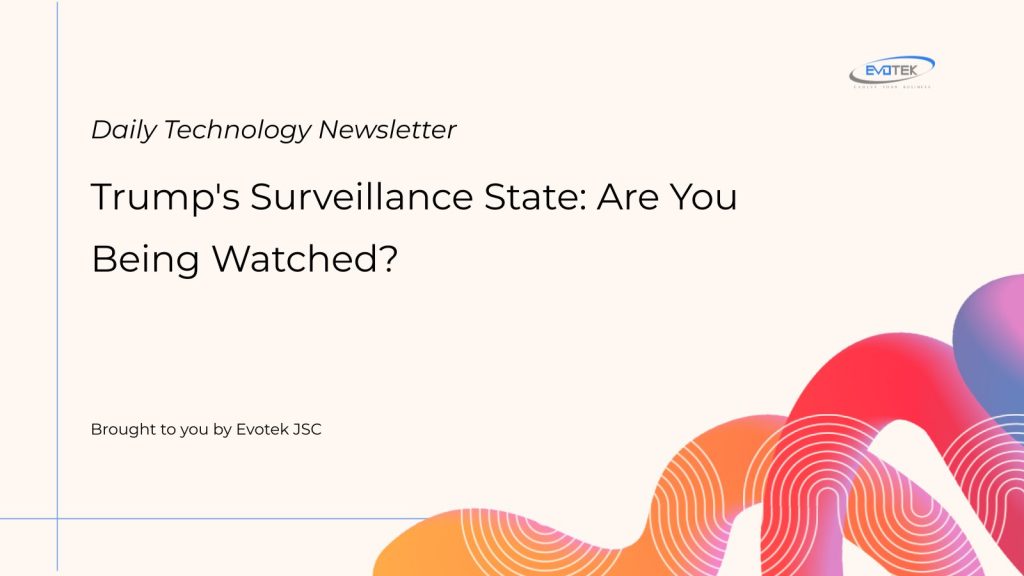The second Trump administration is escalating surveillance tactics, raising concerns about authoritarian overreach. A key element is consolidating vast amounts of personal data into a single, accessible hub.
Rebecca Gordon
TomDispatch
June 28, 2025
Remember the days of landlines and cumbersome wiretapping? Imagine a phone call intercepted, leading to a friend mysteriously calling you back instantly? That was surveillance then. Now, in 2025, the landscape has drastically changed, especially under a Trump-led United States.
The Tech Behind the Curtain
Today’s surveillance arsenal is far more sophisticated. Cell phone triangulation pinpoints your whereabouts. Police procedurals flaunt ubiquitous video surveillance. Facial recognition software, once science fiction, is now reality, matching faces in seconds.
Even old methods are getting a 21st-century upgrade. Drones replace foot patrols, while cameras track license plates at every intersection. While fingerprinting might fail older individuals, facial recognition ensures you are who you say you are, thanks to technologies used by agencies like the TSA.
The Trump administration leverages all of this and more, with a centralized database at the core.
One Ring to Rule Them All…Er, One Database
Despite its name, the Department of Government Efficiency (DOGE) under Elon Musk isn’t streamlining bureaucracy. Its true goal is assembling a massive federal database containing personal information from the IRS, Social Security Administration, and other agencies. This initiative, launched under the guise of “Stopping Waste, Fraud, and Abuse,” raises serious questions about potential misuse of power.
Reports indicate DOGE is bypassing standard data-sharing protocols, potentially compromising privacy and security. Whistleblowers claim oversight is lacking, and objections are met with dismissal or worse.
Even legal challenges face hurdles. A lawsuit by the American Federation of Teachers initially blocked DOGE’s access to Social Security data, but a Supreme Court ruling has temporarily lifted that block.
Palantir: The Seeing Stone
The company Palantir, named after the seeing stones from Lord of the Rings, is instrumental in building this massive database. Led by Peter Thiel, a Trump ally, Palantir’s data platform, Foundry, is being deployed across various government departments. The Trump administration has invested heavily in Palantir, awarding contracts worth millions.
Thiel, a major Trump supporter, is also connected to Clearview, the controversial facial recognition software. His involvement raises concerns about the ethical implications of this data consolidation effort.
The Dark Enlightenment: A Philosophy of Domination
Thiel and other tech figures subscribe to a philosophy known as the “Dark Enlightenment,” an anti-democratic movement that seeks to replace democratic systems with a technocratic elite. This worldview, influencing figures like Vice President JD Vance, poses a threat to fundamental principles of equality and individual rights.
The Dark Enlightenment seeks to dismantle institutions deemed “liberal” and promote a vision of human destiny tied to technology and space colonization, pushing a disregard for Earth and its inhabitants.
Constant Surveillance: The New Normal?
Even local law enforcement is embracing advanced surveillance. In San Francisco, a cryptocurrency billionaire funded a new Real Time Investigation Center (RTIC), promising city-wide drone coverage.
Instead of hiding, we must act as if everything is visible to the Trump regime. The only answer to mass surveillance is mass defiance. Only through open and bold opposition can we challenge this encroaching authoritarianism.
Support Independent Journalism
In these times, independent journalism is more critical than ever. Support news organizations that prioritize truth and accountability.
© 2023 TomDispatch.com
About the Author:
Rebecca Gordon is an Adjunct Professor at the University of San Francisco. She is the author of “American Nuremberg: The U.S. Officials Who Should Stand Trial for Post-9/11 War Crimes” (2016) and previously, “Mainstreaming Torture: Ethical Approaches in the Post-9/11 United States” (2014).
Keywords: Authoritarianism, Big Tech, Department Of Government Efficiency, Donald Trump, Elon Musk, Facial Recognition, Jd Vance, Palantir, Peter Thiel, Surveillance
Related Articles
- Alarm Bells Over JD Vance’s Support For Tracking Women Who Have Abortions
- Trump Is Experimenting With Police-State Tactics
- Trump’s New Order: Making DC Safe, And Beautiful, And Compliant
- The American Public Must Resist Trump’s ‘Papers, Please’ Politics

 日本語
日本語 한국어
한국어 Tiếng Việt
Tiếng Việt 简体中文
简体中文